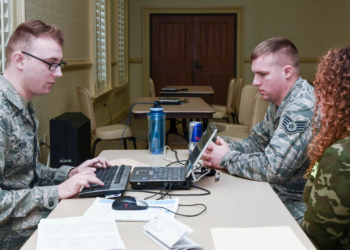Spend less than you earn is a common answer to the question of how to achieve financial security. If only personal finance was that simple for service members. Frequent moves and deployments, military spouse underemployment, and sky-rocketing childcare costs can add layers of uncertainty to a military family’s budget.

Navy Federal Credit Union Outreach Manager Anne Marie Ferdinando, whose family’s military service spans four generations, believes saving money is a key to achieving financial independence, but represents only one step on the road to mastering money. After more than 30 years in the financial services industry – 20 of which have been with Navy Federal, Ferdinando also understands saving is difficult if living paycheck to paycheck.
“The important thing is to start small. Just save something,” she said. “A few dollars here and there. Every little bit counts. And then, if any unexpected expenses come up, you’ll have savings to cover them instead of going into debt.”
While the word “budget” causes a four-letter word response from many people, Ferdinando maintains tracking expenses versus income can uncover money that can be earmarked for an emergency fund.
“We live in a society where we use a lot of [credit] cards,” she said. “We see something we need and we swipe away. But putting [expenses] down on paper will help you build a solid financial plan that’s going to allow you to build a stronger financial future.”
 Once you find $20, $50, $100 or more per month that can go toward building savings, Ferdinando suggests setting up an automatic bank transfer to a savings account or retirement fund. Establishing a “pay yourself first” habit will help to develop a “savings mentality,” she said.
Once you find $20, $50, $100 or more per month that can go toward building savings, Ferdinando suggests setting up an automatic bank transfer to a savings account or retirement fund. Establishing a “pay yourself first” habit will help to develop a “savings mentality,” she said.
While interest rates remain historically low, Ferdinando points out that member-owned credit unions tend to offer the best rates of return on savings products such as savings accounts, money market accounts, and certificates of deposits. In addition, Navy Federal Investment Services, a Navy Federal subsidiary, offers low-cost, online stock trading accounts, portfolio management, life insurance, and trust and estate services.
When starting to save for retirement, she recommends looking no further than the military’s Thrift Savings Plan. She says service members should maximize the Blended Retirement System’s matching TSP contributions rule, which matches dollar for dollar the first 3% contributed while the next 2% is matched 50 cents on the dollar.
“It’s literally free money,” Ferdinando explains. “So, put some of your money into that plan. It’s a well-managed plan and a great tool to see some future growth.”
She adds contributing to a Spousal IRA also can build retirement savings for spouses whose own job opportunities may be limited by frequent moves.
Additional money tips:
- Organize debts based on interest rates and pay down the highest-interest-rate debt first.
- Consider every pay raise (promotion, years of service, or annual) an opportunity to increase TSP contributions by 1% or more.
- Use a compound interest calculator to learn how savings and investments grow over time.
- Before taking out a loan for a major purchase such as a car use an online affordability calculator from Navy Federal to understand the cost of borrowing over the life of the loan.
- If facing unexpected bills, spiraling debt or simply seeking tailored advice, contact Navy Federal, Military OneSource or a military aid society for personal financial counseling assistance.
With more than 60% of military members under the age of 30, time can be a service member’s greatest wealth-building asset if they begin saving for retirement early in their military careers. But most people have to educate themselves about personal finance topics and strategies since money management is not typically taught in school, Ferdinando points out.
“At Navy Federal, we keep on top of the personal finance trends and we create a lot of informative articles for members online,” she said. “MakingCents provides all kinds of articles and videos that can help members learn what will make their future plans, their future wants and needs attainable.”
Visit Navy Federal’s MakingCents to access more resources for your military family.
Looking for even more financial readiness tips? Download our complimentary 2021 Military Money Guide.
Read comments







































